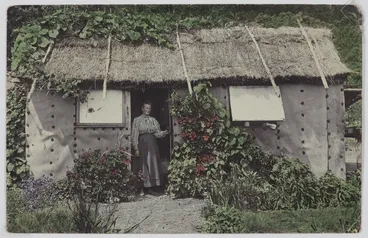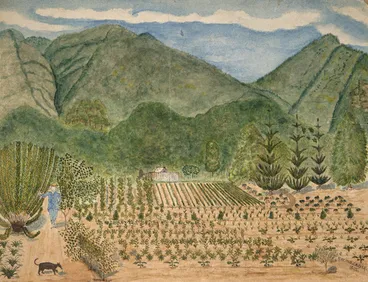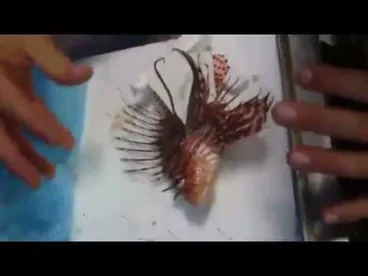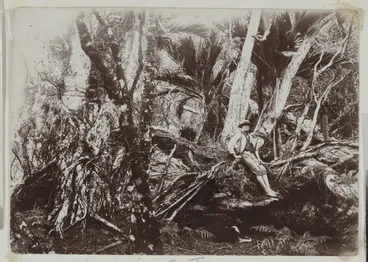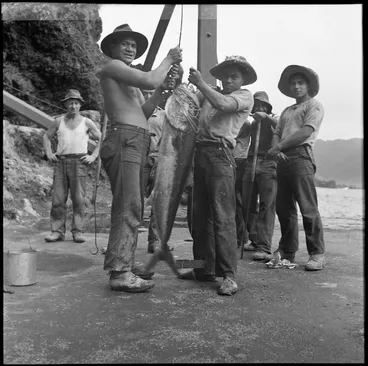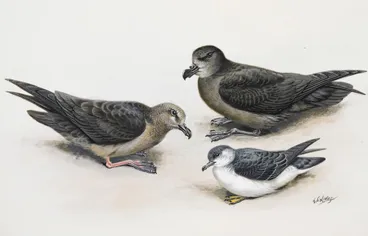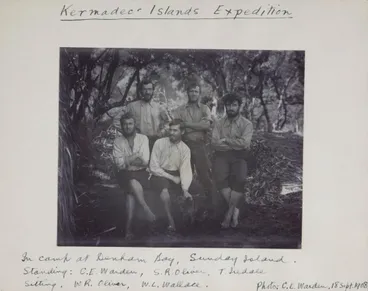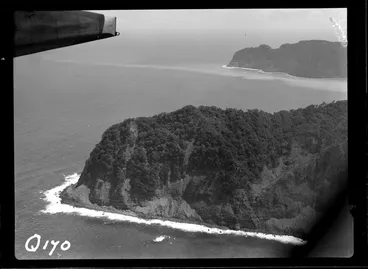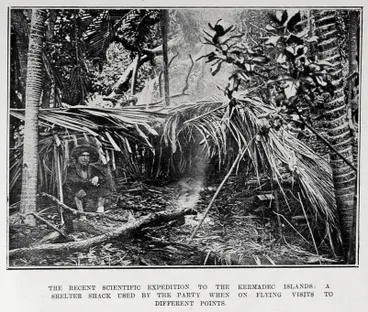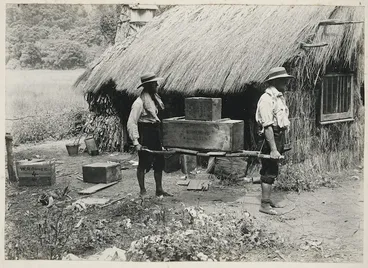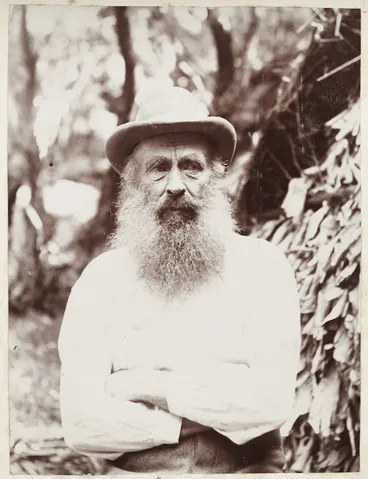KERMADEC
A DigitalNZ Story by gregory o'brien
'Uninhabitable islands surrounded by dangerous rocks.’ This was how a correspondent to the Feilding Star described the Kermadecs in 1886. An honest statement, as far as it goes--yet this island-group, New Zealand's northernmost territory, is a much more complex, fascinating, challenging and inspiring place than that. In the past the islands have attracted Crusoe-like settlers and wash-ins, of whom the self-professed Kermadec king Thomas Bell (resident from 1877-1913) was the most notable. Scientists are still coming to terms with the place (since the documented 1907 Oliver Expedition, you could count the number of serious scientific forays into the region on the fingers of one hand. It remains, to this day, an exciting frontier). Over the past century, the navy has visited, as have meteorologists, coast-watchers, conservationists and some overly optimistic orchardists, who tried, unsuccessfully, to set up an orange-exporting operation. A German raider was based off Raoul Island-the main Kermadec island-during World War One. Artists including John Pule, Robin White and Phil Dadson travelled there in 2011 and the work they made as a result can be seen at www.kermadecexhibition.com. If the remoteness of the Kermadecs makes them hard for humans to get a handle on, the land, sea and sky of the region are a hub for fishes and seabirds, and the waters are a migratory route for many whale species. While Raoul is visited by considerably fewer people than the number who make it to the top of Mount Everest, the Kermadecs are a relevant and powerful part of Aotearoa/New Zealand, our stepping stone to the Pacific Islands, rich in Polynesian as well as European history and mythology, a pristine oceanic environment and one of the very few territories of New Zealand that come close to being 100% Pure. The Kermadecs is a region about which we still have much to learn and it’s a part of New Zealand we will be hearing a lot more about in the future. The majority of these photographs locate the Kermadecs in the past. Steve Gentry’s book, RAOUL AND THE KERMADECS, launched at the National Library in September 2013, brings the story right up to date. And further information is at www.thekermadecs.org Kermadec Vast continent of every tilted or rolling thing—eyes and teeth of implausible fish, stars and planets on their undersea orbits. Raoul Ghost shark, anvil, kite starboard, windward, my childhood on Raoul Island, sustain me. Orange supply, Raoul Island Bird rattle of a cyclone-tossed greenness ever-decreasing orchard. Oneraki Beach, Raoul Island Unbreaking rocks Broken sea Unbroken sea Breaking rocks Kermadec Trench 2 Everything overheard or lost from hearing: song of the coral palm, diving petrel and one-eyed urchin chapter and verse of the Isaiah-fish, bird- burrowed sea in which we dive down and are retrieved—that which light enters so as never to leave. Oneraki Beach, Raoul Island I was raised by rocks, but not as one of them. Upended by storms, I was raised by nikau palms, but I was never one of them. I was raised by waves— the waves talking, always talking to themselves, always listening— and raised as one of them Emotional life of Thomas Bell, Raoul Island The lake in the poem depends upon who stands before it—Hettie or Bess or, most likely Mary. It might have been the Blue or the Green— or maybe lakes had no names back then? The hills moved instinctively north or, less often, south and the transient Wolverine Rock which kept reappearing offshore, but only upon the birth of a daughter, was neither here nor there. The weather takes the edges off most things. The island tethered or set adrift depending on which daughter dives into which lake. But it is their eyes I remember most not as they looked, but as they looked at me or at someone who stood where I stand as if to lose what I have lost. (poems by Gregory O'Brien, written on Raoul Island, May 2011)
Kermadecs, artists, Gregory OBrien, poets, Raoul Island, Sunday Island
View of Denham Bay surrounded by bush, Raoul Island, Kermadec Islands
Alexander Turnbull Library
Kermadec petrel fledgling
Museum of New Zealand Te Papa Tongarewa
Red-tailed Tropic Bird, Kermadec Islands
Museum of New Zealand Te Papa Tongarewa
John Sorensen and unidentified man, Raoul Island, Kermadec Islands
Alexander Turnbull Library
A FISHING CATCH AT SUNDAY ISLAND IN THE KERMADEC GROUP
Auckland Libraries
Volume 42, 1909
Alexander Turnbull Library
Men harvesting oranges, Raoul Island
Alexander Turnbull Library
Royal New Zealand Navy disembarking stores
Manatū Taonga, the Ministry for Culture and Heritage
Sooty terns, Denham Bay, Sunday [Raoul] Island
Museum of New Zealand Te Papa Tongarewa
Carver, Robert William Ind 1838-1907 :Dripping stone ; Sunday Island] / R W I C [1892?]
Alexander Turnbull Library
Frederica Bell, Denham Bay, Raoul Island, Kermadec Islands
Alexander Turnbull Library
Carver, Robert William Ind 1838-1907 :Bell's kitchen garden 1892
Alexander Turnbull Library
LIFE ON SUNDAY ISLAND. (Auckland Star, 01 May 1890)
National Library of New Zealand
Zebra Lionfish - Kermadec Expedition
Auckland War Memorial Museum Tāmaki Paenga Hira
King Bell, Raoul Island, Kermadec Islands
Alexander Turnbull Library
Niuean men with large kingfish, Raoul Island, Kermadec Islands
Alexander Turnbull Library
TWELVE YEARS ON THE KERMADECS. (Hawke's Bay Herald, 19 October 1891)
National Library of New Zealand
THE RECAPTURE AT THE KERMADECS. (Wanganui Chronicle, 26 December 1917)
National Library of New Zealand
Puff on the Kermadec Islands (Feilding Star, 08 June 1886)
National Library of New Zealand
Kermadec Petrel (left) / Grey-faced Petrel (above right) / Subantarctic Little Shearwater
Museum of New Zealand Te Papa Tongarewa
'Kermadec Islands Expedition - In camp at Denham Bay, Sunday Island.'
Museum of New Zealand Te Papa Tongarewa
Two men carrying boxes on a stretcher, Raoul Island
Alexander Turnbull Library
Thomas Bell
Alexander Turnbull Library
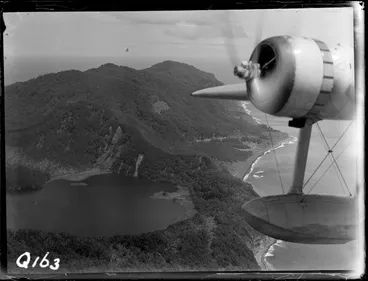
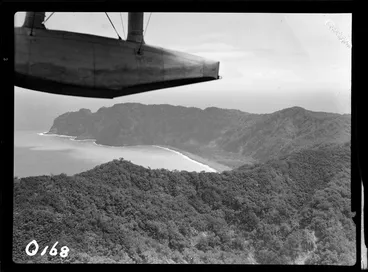
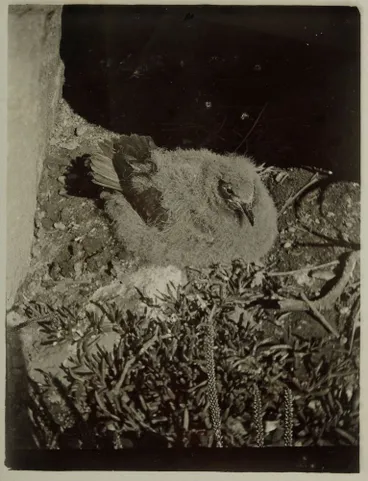
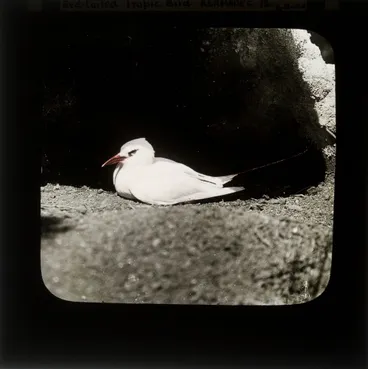
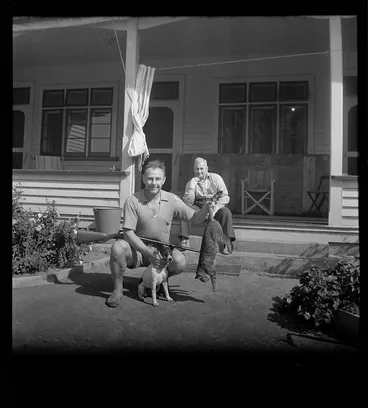
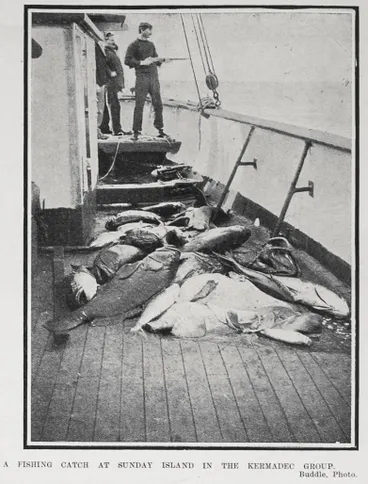

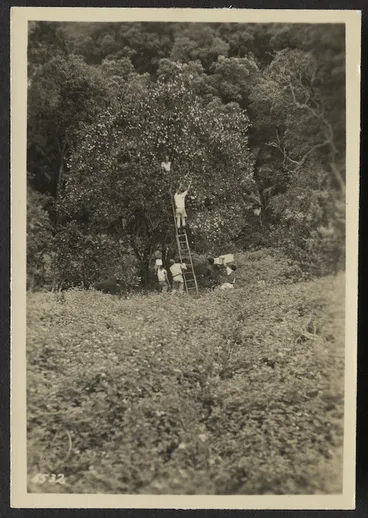
![Beautemps-Beaupre, C. F. :Carte des iles Kermadec, situes dans le grand Ocean Austral, entre la Nouvelle Zelande et les Isles des Amis. Levee et dressee dans le voyage du Contre-Amiral Bruny Dentrecasteaux par C. F. Beautemps-Beaupre, Ingenieur-Hydrographe, en 1793 (An 1er). [Paris, 1807] Image: Beautemps-Beaupre, C. F. :Carte des iles Kermadec, situes dans le grand Ocean Austral, entre la Nouvelle Zelande et les Isles des Amis. Levee et dressee dans le voyage du Contre-Amiral Bruny Dentrecasteaux par C. F. Beautemps-Beaupre, Ingenieur-Hydrographe, en 1793 (An 1er). [Paris, 1807]](https://images.digitalnz.org/USIYdAVHz5HXF5bFJYC4xPCoqCQ=/368x0/https%3A%2F%2Fndhadeliver.natlib.govt.nz%2FNLNZStreamGate%2Fget%3Fdps_pid%3DIE96604)
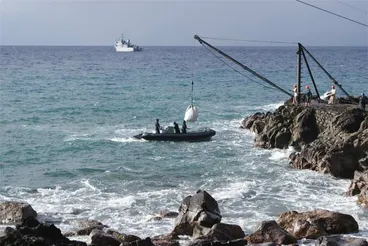
![Sooty terns, Denham Bay, Sunday [Raoul] Island Image: Sooty terns, Denham Bay, Sunday [Raoul] Island](https://images.digitalnz.org/xw5bcj6xzNtzML6dLmPw9Iy5Yhs=/368x0/https%3A%2F%2Fmedia.tepapa.govt.nz%2Fcollection%2F343644%2Fpreview)
![Carver, Robert William Ind 1838-1907 :Dripping stone ; Sunday Island] / R W I C [1892?] Image: Carver, Robert William Ind 1838-1907 :Dripping stone ; Sunday Island] / R W I C [1892?]](https://images.digitalnz.org/xbk7WYoq93gFHyIb0-2X8ja7eeI=/368x0/https%3A%2F%2Fndhadeliver.natlib.govt.nz%2FNLNZStreamGate%2Fget%3Fdps_pid%3DIE4658)
